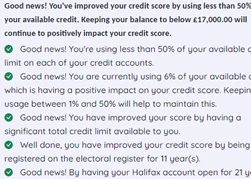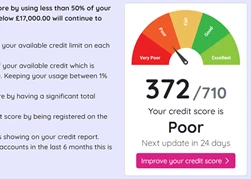What Affects Your Credit Score the Most?

28th Sep 2025
Your credit score can open doors - or slam them shut. From getting approved for a mortgage to securing car finance or even renting a flat, this single number can shape your financial future. Yet most people don’t actually know what affects their score the most.
Here’s the truth: it’s not just about paying bills on time. Lenders, landlords, and even employers may run a credit history check UK to decide whether to trust you financially. That’s why it’s crucial to check your credit report history regularly and understand what really drives your score up or down.
In this guide, we’ll uncover the biggest factors influencing your credit score in the UK - and how a simple credit check online can help you take control before it’s too late.
Why Your Credit Score Matters
Your credit score is more than just a number. In the UK, it plays a central role in shaping your financial opportunities:
- · Loan and mortgage approvals - Lenders rely on your score to determine eligibility.
- · Interest rates - A higher score often means lower borrowing costs.
- · Rental checks - Landlords typically conduct a credit history check UK before signing tenancy agreements.
- · Job applications - Some employers review your financial record.
By carrying out a credit check online or reviewing your credit report history, you gain a clear picture of where you stand - and what needs improving.
1. Payment History - The Most Important Factor
Nothing impacts your credit score more than your payment history. It shows whether you’ve kept up with repayments on loans, credit cards, and bills.
- · Late or missed payments can stay on your report for up to six years.
- · Even one default may significantly lower your score.
- · Setting up direct debits helps you avoid accidental missed payments.
Checking your credit report history regularly ensures no mistakes or unpaid accounts are dragging down your score. If something looks wrong, you can raise a dispute with the credit reference agency.
2. Credit Utilisation - How Much Credit You Use
Credit utilisation refers to how much of your available credit you’re currently using.
- · Aim to use less than 30% of your credit limit.
- · High utilisation suggests financial strain and lowers your score.
- · Paying off balances in full every month is the healthiest approach.
When you run a credit check online, you’ll see how lenders view your utilisation rate - an important insight if you’re planning to apply for new credit.
3. Length of Credit History
The age of your accounts also matters. Lenders want to see evidence that you can manage credit responsibly over a long period.
- · Keeping older accounts open can strengthen your history.
- · Closing long-held credit cards might shorten your record and reduce your score.
- · New borrowers will need time to build up a solid track record.
A credit history check UK highlights the length of your accounts, giving you a better idea of how stable your profile looks to potential lenders.
4. Types of Credit Accounts
Having a mix of credit types shows that you can manage different forms of borrowing.
- · A healthy balance of credit cards, loans, and contracts (e.g. phone plans) is ideal.
- · Relying heavily on payday loans or short-term credit can hurt your rating.
- · Diversity signals financial responsibility.
When you check your credit report history, you’ll see exactly what mix of credit accounts lenders can view.
5. New Credit Applications
Every time you apply for new credit, a “hard search” is recorded. Too many applications in a short time can damage your score.
- · Too many hard searches signal risk to lenders.
- · Space out applications where possible.
- · Remember: soft checks (like a personal credit check online) don’t affect your score.
By reviewing your credit report history, you’ll know how many searches are currently visible to lenders.
6. Other Factors That Influence Your Score
Beyond the main areas, there are several additional factors:
- · Electoral roll registration - Being registered boosts your score.
- · Court judgments (CCJs), IVAs, and bankruptcies - These remain for up to six years and are highly damaging.
- · Financial associations - Joint accounts or mortgages link your record with another person’s financial behaviour.
- Regularly running a credit history check UK helps you catch and manage these red flags.
How to Improve Your Credit Score in the UK
The good news? Improving your score is absolutely possible. It just requires consistency:
- 1. Pay all bills on time - Reliability is the biggest factor.
- 2. Keep balances low - Under 30% utilisation works best.
- 3. Register to vote - It instantly adds credibility to your report.
- 4. Limit new credit applications - Only apply when necessary.
- 5. Check your records for errors - A regular credit check online can help you find and fix mistakes quickly.
FAQs About Credit Scores
Q: How often should I check my credit report history?
A: At least once a year, but quarterly is even better to catch errors early.
Q: Does checking my score lower it?
A: No - using a credit check online service is a soft search and doesn’t affect your score.
Q: How long do missed payments stay on my report?
A: Typically six years.
Q: Can a credit history check UK improve my score?
A: The check itself doesn’t improve your score - but it helps you identify what needs fixing.
Final Thoughts:
The factors that affect your credit score the most are payment history and credit utilisation, but account age, credit mix, and new applications all play a role too.
By carrying out a regular credit history check UK, reviewing your credit report history, and using trusted credit check online services, you can stay in control of your financial reputation. Small changes today can make a big difference when you’re ready to borrow tomorrow.
Don't risk missing
something important
Access a comprehensive credit report
that includes detailed data from TransUnion
View your credit score for only £1.95.
You can view it for 1 month, after which it will be £14.95 per month unless cancelled.
See How You Score

See How You Score
An Independent View Of Your Credit Score
Lenders typically use their own systems to calculate your Credit Score based on the information in your Credit Report, often checking with one or more Credit Reference Agencies. Your Credit Check Online Credit Score is derived from all the Credit Report information we gather from TransUnion, helping you understand how you might be assessed when applying for credit.

Understand What is Affecting Your Credit Score
Quickly see how the details in your Credit Report influence your Credit Check Online Credit Score, both positively and negatively. This clear overview helps you identify areas for improvement and better understand the factors that lenders consider when assessing your creditworthiness.
View your credit score for only £1.95.
You can view it for 1 month, after which it will be £14.95 per month unless cancelled.